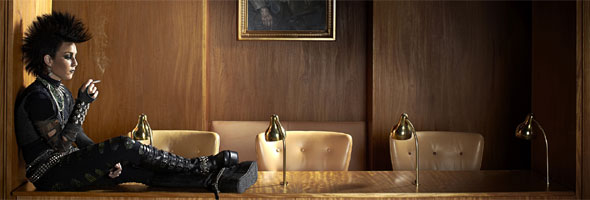Of Stieg Larsson's three complicated, violent Millennium novels, The Girl Who Kicked The Hornet's Nest is by far the knottiest. What started in The Girl With The Dragon Tattoo as a relatively simple story about two mismatched sleuths investigating family history in remote northern Sweden has ballooned, in the third and final novel, to a full-blown government conspiracy, multiple assassination plots and several violent confrontations in locales as unlikely as a hospital and abandoned brick factory. At the center of it all again is the mercurial, fascinating Lisbeth Salander, but after being on the lam for the entirety of the second book, she's holed up in a hospital and jail cell this time, not even sporting her signature piercings and eye makeup until well into the third act.
Except, because her role is so passive, Lisbeth isn't really the center of the story at all, and that's just one of the tricky problems that the movie adaptation of The Girl Who Kicked The Hornet's Nest fails to satisfyingly solve. It's no mean feat, of course, to adapt Larsson's novel, which is compelling but in desperate need of a good editor, and director Daniel Alfredson (returning from the second film) and writers Jonas Frykberg and Ulf Ryberg make smart decisions about where to streamline Larsson's story. But they also totally ignore the slim thread of contact between Lisbeth (Noomi Rapace) and her journalist pal Mikael (Michael Nyqvist) that gave the novel its emotional weight through all the conspiracy talk. Without these two at the center of the wild vortex of Swedish names and government policies, it's easy to get lost or worse, not care at all.
If it has seemed all along that Lisbeth Salander was unfairly persecuted by the rest of the world, in Hornet's Nest we get a pretty clear explanation why. Her father Zalachenko (Georgi Staykov), who she attempts to kill at the end of the second film, isn't just a mean son of a bitch but a highly placed Soviet spy who is well-protected by a secret arm of the Swedish government, dubbed The Section, that exists entirely to protect him. They've spent decades covering up Zalachenko's various misdeeds, including his vicious treatment of Lisbeth's mother, and Lisbeth herself is the biggest cover-up, locked away in a children's asylum at age 12 when she attempted to kill her father with a Molotov cocktail. Everything that's befallen Lisbeth since then-- her treatment as incompetent by the government, her rape so graphically depicted in the first film, her incredible isolation from society-- is thanks to The Section's interference, and you can bet they spring into action the moment they hear of her latest attempt to kill her nasty but valuable father.
The Section consists of a bunch of old white men holed up in a musty office, and though their presence is a commentary on the immorality at the heart of Swedish society and the banality of evil, their scenes are exactly as dull as you might imagine. Only marginally more interesting is Mikael's plot, as he pieces together Lisbeth's life story in time for both his splashy magazine piece and her trial, which technically is trying her on murder charges but will wind up determining her sanity and character instead (apparently the Swedish court system is quite different from ours). In the book Lisbeth and Mikael worked together furtively, via a stashed computer, to help uncover the Section and clear her name, but this time he's basically working on his own, with the help of his editor and sometimes-lover Erika Berger (Lena Endre) and a foxy cop (Monica Figuerola) who jumps in bed with him in the book but keeps things professional this time around.
Because the forward movement of the plot is so eggheady, hinging on uncovering a single court document and when to publish a magazine, the rare moments when the film ventures into physical action are the best, particular a late confrontation between Lisbeth and her giant, violent half-brother. What we need more than gunfire or violence, though, is Lisbeth and Mikael together, the unlikely partners up against the world whose friendship buoys Larsson's books even at their most rambling and impenetrable. The Hornet's Nest book suffers from these two characters being apart, but the movie-- unable to sift through the deep layers of plot and the many characters-- hurts even more from their partnership's absence.
Running at nearly two and a half hours, Hornet's Nest is surprisingly fleet and mostly entertaining, but aside from some excellent casting choices and the still-remarkable Rapace as steely Lisbeth, it's impossible to imagine choosing the truncated film version over Larsson's novel, which is impressive in its dogged adherence to its shambling structure. There is a tight, well-plotted movie to be made by judiciously altering the book, but Alfredson is merely interested in repeating the highlights, recreating the best moments of the book but also the worst, resulting in a film that hits with precision as often as it seems to drag endlessly. With the Swedish take on the trilogy wrapped up it's now time to look forward to the next step, the American, David Fincher-directed editions, which hopefully will choose a little better in how to capture the weird spirit of Larsson's novels in a movie that actually manages to stand on its own.
Staff Writer at CinemaBlend












